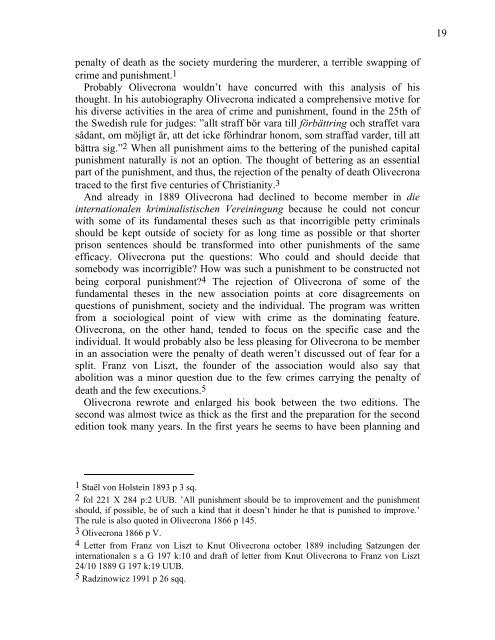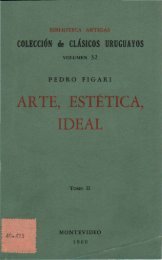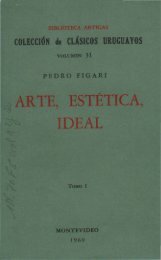Knut Olivecrona and his ”Om dödsstraffet”. - Figuras
Knut Olivecrona and his ”Om dödsstraffet”. - Figuras
Knut Olivecrona and his ”Om dödsstraffet”. - Figuras
You also want an ePaper? Increase the reach of your titles
YUMPU automatically turns print PDFs into web optimized ePapers that Google loves.
penalty of death as the society murdering the murderer, a terrible swapping of<br />
crime <strong>and</strong> punishment.1<br />
Probably <strong>Olivecrona</strong> wouldn’t have concurred with t<strong>his</strong> analysis of <strong>his</strong><br />
thought. In <strong>his</strong> autobiography <strong>Olivecrona</strong> indicated a comprehensive motive for<br />
<strong>his</strong> diverse activities in the area of crime <strong>and</strong> punishment, found in the 25th of<br />
the Swedish rule for judges: ”allt straff bör vara till förbättring och straffet vara<br />
sådant, om möjligt är, att det icke förhindrar honom, som straffad varder, till att<br />
bättra sig.” 2 When all punishment aims to the bettering of the punished capital<br />
punishment naturally is not an option. The thought of bettering as an essential<br />
part of the punishment, <strong>and</strong> thus, the rejection of the penalty of death <strong>Olivecrona</strong><br />
traced to the first five centuries of Christianity.3<br />
And already in 1889 <strong>Olivecrona</strong> had declined to become member in die<br />
internationalen kriminalistischen Vereiningung because he could not concur<br />
with some of its fundamental theses such as that incorrigible petty criminals<br />
should be kept outside of society for as long time as possible or that shorter<br />
prison sentences should be transformed into other punishments of the same<br />
efficacy. <strong>Olivecrona</strong> put the questions: Who could <strong>and</strong> should decide that<br />
somebody was incorrigible? How was such a punishment to be constructed not<br />
being corporal punishment?4 The rejection of <strong>Olivecrona</strong> of some of the<br />
fundamental theses in the new association points at core disagreements on<br />
questions of punishment, society <strong>and</strong> the individual. The program was written<br />
from a sociological point of view with crime as the dominating feature.<br />
<strong>Olivecrona</strong>, on the other h<strong>and</strong>, tended to focus on the specific case <strong>and</strong> the<br />
individual. It would probably also be less pleasing for <strong>Olivecrona</strong> to be member<br />
in an association were the penalty of death weren’t discussed out of fear for a<br />
split. Franz von Liszt, the founder of the association would also say that<br />
abolition was a minor question due to the few crimes carrying the penalty of<br />
death <strong>and</strong> the few executions. 5<br />
<strong>Olivecrona</strong> rewrote <strong>and</strong> enlarged <strong>his</strong> book between the two editions. The<br />
second was almost twice as thick as the first <strong>and</strong> the preparation for the second<br />
edition took many years. In the first years he seems to have been planning <strong>and</strong><br />
1 Staël von Holstein 1893 p 3 sq.<br />
2 fol 221 X 284 p:2 UUB. ’All punishment should be to improvement <strong>and</strong> the punishment<br />
should, if possible, be of such a kind that it doesn’t hinder he that is punished to improve.’<br />
The rule is also quoted in <strong>Olivecrona</strong> 1866 p 145.<br />
3 <strong>Olivecrona</strong> 1866 p V.<br />
4 Letter from Franz von Liszt to <strong>Knut</strong> <strong>Olivecrona</strong> october 1889 including Satzungen der<br />
internationalen s a G 197 k:10 <strong>and</strong> draft of letter from <strong>Knut</strong> <strong>Olivecrona</strong> to Franz von Liszt<br />
24/10 1889 G 197 k:19 UUB.<br />
5 Radzinowicz 1991 p 26 sqq.<br />
19






